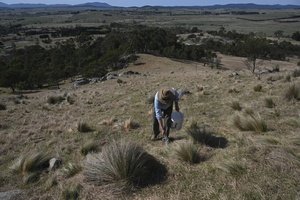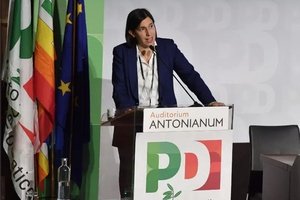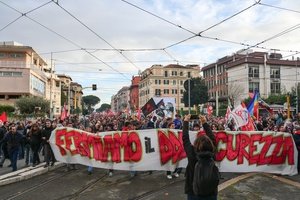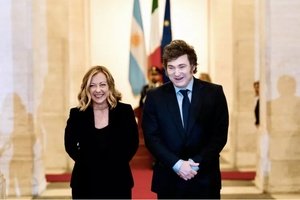For Italo-Australians and the diasporic community at large, cultural identity cannot be conveniently generalised or pigeonholed. There is an undeniable fracturing that occurs at the hands of the migrant experience, one that echoes through generations, whether first or fourth, rendering each individual’s experience of their heritage entirely singular.
Some of us were born and bred in the Bel Paese, and some have never set foot on Italian soil. Some speak the language with perfect fluency, and others, only fragments of our nonni’s terse dialect. Some endured racism, poverty and destitution in their struggle to carve out a better life in a new country, and some were raised cushioned by privilege thanks to those very sacrifices.
One thing generally agreed upon is that being Italian is something that one deeply feels: an unyielding connection to family and community; to food, storytelling, art and tradition.
As a cultural community that has endured, persevered and triumphed, it is of great importance that in 2022, amidst important conversations regarding decolonisation, civil rights movements such as #MeToo, #BlackLivesMatter, Marriage Equality, and First Nations Land Rights, that Italians ask themselves : Who are we? What do we believe in? How can we unite to acknowledge both past hardships and current privileges when approaching the issues of the modern world?
These are the questions that participants of the ‘Made in Italy, Grown in Australia’ event sought to begin unpacking.
On the evening of October 11 at Carlton’s Co.As.It. headquarters, activist, ally and academic, Dr Maria Pallotta-Chiarolli, AM, led a multigenerational panel of Italian and Italo-Australian speakers, all of whom were called upon to respond to these pressing issues.
In a packed room abuzz with eager ears and open hearts, the evening was kicked off with an introduction by Dr Paolo Baracchi, Manager of Cultural Programs at Co.As.It.
“Third spaces, whether trans-cultural or intergenerational, are difficult spaces to inhabit. They are spaces of uncertainty and doubt, in which time-honoured, ready-made certainties must be questioned,” Baracchi ventured, poignantly introducing the evening’s themes before passing la parola to organiser Pallotta-Chiarolli.
The internationally recognised writer, researcher and lecturer began by stressing that these are the kinds of conversations Italians everywhere should be having:
“I don’t want to stereotype, but our families came to this country poor; we experienced racism, there was destitution, there was war. Outside these walls now... there are some terrible things happening. But we now, as Italians, are mostly in a position of privilege,” she said.
“So, while we continue to celebrate our culture, we can also hold our culture to account. How do we use our privilege? How do we use some of our hard-earned knowledge?”
Pallotta-Chiarolli used her allotted time to speak about a trip that she took with her family to Cowra. She explained how, while visiting the many monuments dedicated to the Italian Prisoners of War, she noticed a distinct lack of acknowledgment of First Peoples on the premises ― the Erambie Mission was a stone’s throw away, across the river. She highlighted that this is a perfect example of how the Italian community could leverage its privilege, without forgetting what our ancestors endured:
“What can we do about this as Italians; could we go there and say, ‘can you please acknowledge the First Peoples here, while we acknowledge our prisoners of war?’”
Next to take the stage was Sara Bavato, Italian translator and journalist for Il Globo and one of the founders of ‘Ascolta Women’. Having moved to Australia from Italy nine years ago, Sara spoke about the unique position she occupies as a journalist working between two cultures. In attempting to understand Australia through her many interviews with people from all walks of life, Bavato began to question her own identity as an Italian.
“Because I was born and raised there, I speak the language, [and] I thought, that’s what makes me Italian, but it’s not. Because I’ve met a lot of people who were born here, some never having set foot in Italy, some who don’t speak the language, but who feel Italian, and that needs to be acknowledged and embraced.”
Bavato went on to stress the importance of having spaces for open dialogue, like those provided by Co.As.It., where the community can freely share, discuss and even broach thornier issues, from Italy’s own colonial past to its often male-dominated narratives of migration.
Dr Matteo Vergani was next. A lecturer in Sociology at Deakin University, who came to Australia 10 years ago, Vergani spoke of his inner conflict between his Italian pride and simultaneous deep frustration with his country.
While acknowledging that Australia is far from perfect, Vergani lamented the fact that in his sector of social security, a sense of close-mindedness and ideological fixity tends to pervade Italy’s laws and infrastructure.
“What can we do? I think our responsibility as people who travel between two worlds is to get in touch with Italy... to bring to it what we have learned in this country with a lot of diversity,” Vergani suggested.
Francesca Rizzoli, a Chilean-born, Italian descendant, and a filmmaker, photographer and journalist working for SBS, spoke for the first time about her forthcoming documentary The Love of My Life, a bold and uncompromising short film that tells the story of Gail and Lisette, who came out as transgender and lesbian in their mid-fifties, which will screen on ABC’s Compass in February 2023.
To the question of why an Italian-Chilean-Australian should be the one to make a documentary about the two women, Rizzoli replied, “Why not?!”
“I don’t think you need to be a transgender person to tell a story about trans people... This is not a story made by a transgender person – that’s very clear; it’s made by a cisgender person who’s trying to learn and understand this gender identity.”
Rizzoli went on to express that while her film is a trans story, at its core it’s a human story. She explained how she found that, as a migrant, she could relate to Gail and Lisette’s struggle to find a sense of belonging, though she acknowledges her relative privilege in comparison to the two.
“I don’t like it when people tell me, ‘You don’t look Chilean’. Yes, I am Chilean, I grew up there, I was born there. Then, I’m Italian, because my parents are Italian and I feel that connection, and now I’m also Australian – no one should tell me who I am, so why should we tell [Gail and Lisette] who they are?”

Francesca Rizzoli, (left to right) Archimede Fusillo, Tony Romanelli, Sara Bavato and Maria Pallotta-Chiarolli.
Tony Romanelli, an Italo-Australian gay activist, educator and policy writer, took inspiration from his recent viewing of a film about Ennio Morricone, categorising The Good, the Bad and the Ugly aspects of being Italian, from his vantage point as a queer man.
Born to migrant parents in a Perth country town, only finding the courage to come out after getting married and having two children, Tony cited family, collectivism, food and culture as indelible strengths of being part of an Italian community. However, toxic hypermasculinity, the inherent fear of brutta figura and an overall lack of representation are aspects of Italian culture he has found particularly damaging.
“Growing up as in Italian in an anglo host culture, without realising it, we’re having to travel those borders between both worlds. It was hard enough trying to navigate that as a straight man, so when I added the layer of being gay, I had to figure out how I could be queer and still remain connected to my culture,” Romanelli explained.
The last speaker was Italo-Australian novelist Archimede Fusillo, who titled his segment No Voice, No Power.
Fusillo advocated for the representation of all cultures and marginalised groups, particularly in an academic environment, recounting memories from his childhood, growing up in a migrant family in Fitzroy North: particularly heartrending was an instance in which he was sent to remedial English class by a teacher. Why? Because his surname ends in ‘o’.
“If you don’t have a voice, you can’t have power – no one hears you. And that’s what it was like for me growing up. My books were the result of me growing up in an environment, particularly an education environment, where I never saw myself, and the world I actually inhabited, reflected back at me,” Fusillo told audience members.
As the panel came to a close and participants were thanked, Pallotta-Chiarolli receiving a congratulatory bunch of flowers for her recently acquired honour as an Order of Australia, the Q&A session began ― a true highlight of the evening.
“I don’t really know many gay people: thank you so much for sharing your story,” one audience member told Romanelli.
Others shared their own experiences ― of discrimination, of joy, of migration and more. Many questioned how it is that the community can continue to grow and evolve.
While tackling the question of what it means to be Italian might feel like a gargantuan task, with all that unites and divides us, sitting in the Co.As.It. conference room, humming with laughter and engaged conversation, one feels hopeful that together, through open and generous dialogues like these, the community might find immense connection in its pursuit of the answer.












